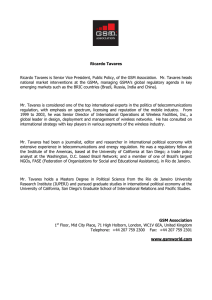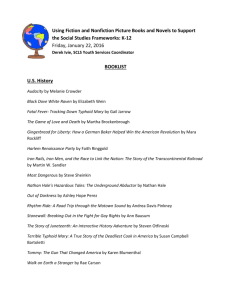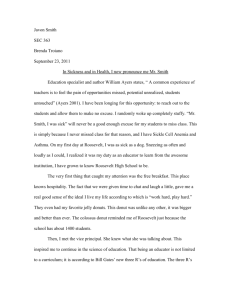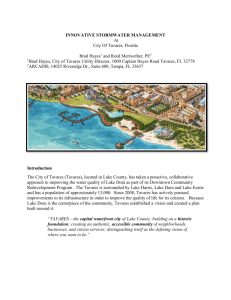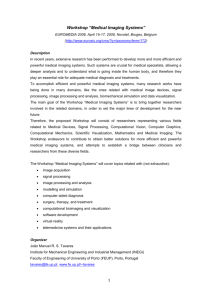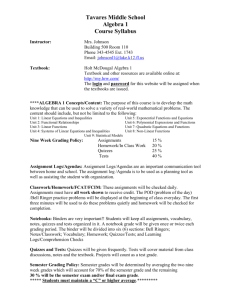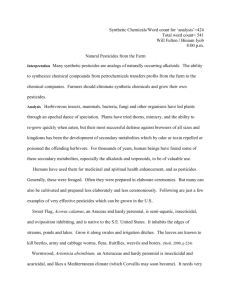Editorial TRUST, HOPE, A MERRY CHRISTMAS AND A PROSPER
advertisement
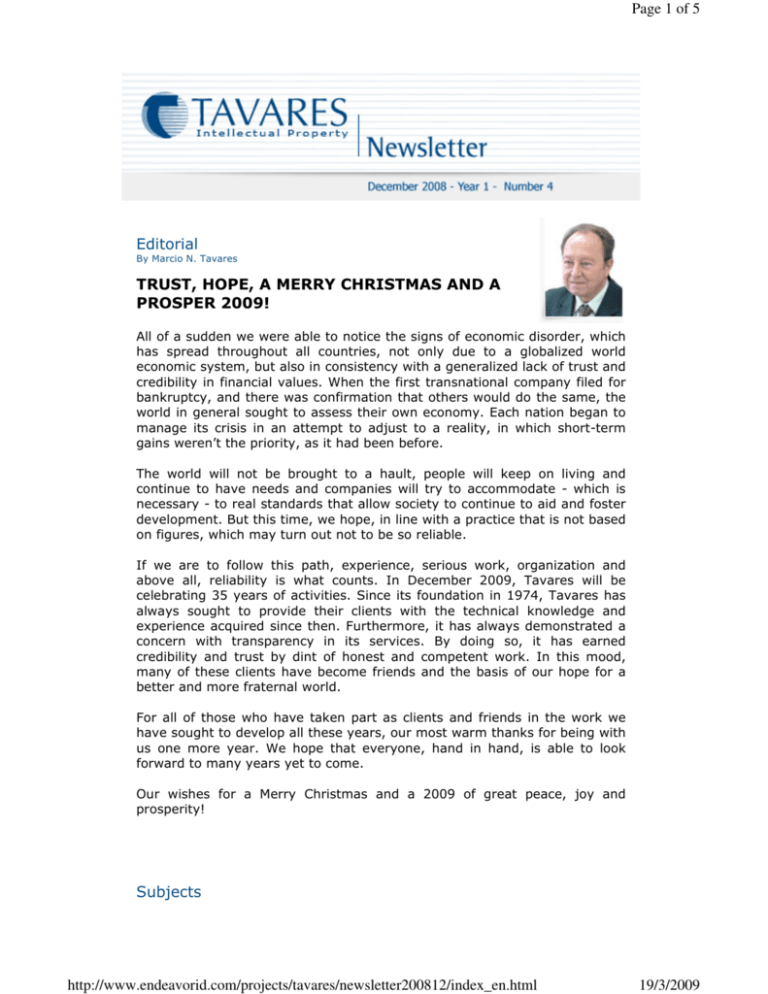
Page 1 of 5 Editorial By Marcio N. Tavares TRUST, HOPE, A MERRY CHRISTMAS AND A PROSPER 2009! All of a sudden we were able to notice the signs of economic disorder, which has spread throughout all countries, not only due to a globalized world economic system, but also in consistency with a generalized lack of trust and credibility in financial values. When the first transnational company filed for bankruptcy, and there was confirmation that others would do the same, the world in general sought to assess their own economy. Each nation began to manage its crisis in an attempt to adjust to a reality, in which short-term gains weren’t the priority, as it had been before. The world will not be brought to a hault, people will keep on living and continue to have needs and companies will try to accommodate - which is necessary - to real standards that allow society to continue to aid and foster development. But this time, we hope, in line with a practice that is not based on figures, which may turn out not to be so reliable. If we are to follow this path, experience, serious work, organization and above all, reliability is what counts. In December 2009, Tavares will be celebrating 35 years of activities. Since its foundation in 1974, Tavares has always sought to provide their clients with the technical knowledge and experience acquired since then. Furthermore, it has always demonstrated a concern with transparency in its services. By doing so, it has earned credibility and trust by dint of honest and competent work. In this mood, many of these clients have become friends and the basis of our hope for a better and more fraternal world. For all of those who have taken part as clients and friends in the work we have sought to develop all these years, our most warm thanks for being with us one more year. We hope that everyone, hand in hand, is able to look forward to many years yet to come. Our wishes for a Merry Christmas and a 2009 of great peace, joy and prosperity! Subjects http://www.endeavorid.com/projects/tavares/newsletter200812/index_en.html 19/3/2009 Page 2 of 5 THE DISTINCTIVENESS ACQUISITION THROUGH THE USE OF BRAND: THE "SECONDARY MEANING" Ana Paula Brito and Natascha Oliveira THERAPEUTIC METHOD PATENTS AND THE CURRENT APPLICATION OF ARTICLE 32 Bruno Maini THE DISTINCTIVENESS ACQUISITION THROUGH THE USE OF BRAND: THE "SECONDARY MEANING" Ana Paula Brito and Natascha Oliveira Contrary to the dilution phenomenon of a trademark sign’s distinctive value, we find in our legal system the doctrine of "secondary meaning", which consists of the acquisition of distinctiveness due to the use of a sign that was not at first subject to registration as a mark. In fact, there are signs that become vulgarized through its use, and there are signs that, the other way around, from ordinary become distinctive by virtue of its very use. The "secondary meaning" is the phenomenon by which a previously weak sign of ordinary or secondary use acquires distinctiveness through regular use, as well as due to the investments undertaken by the holder, entitling the once weak sign to protection with exclusivity since it has attained public awareness as a first-rate mark. The Industrial Property Law (Law 9.276/96) does not bring an explicit legal provision which supports the doctrine of "secondary meaning" but this does not mean that it is not provided for in our legal system, that it is not afforded shelter within the Brazilian Intellectual Property system. The Paris Union Convention - CUP incorporated to Brazilian law by Decree No. 75,572, in its Article 6 d C11 stipulates that "in determining whether the mark is subject to protection, all the circumstances of fact should be taken into consideration, particularly the length of the mark’s use.”. Therefore, this doctrine sets out that the distinctive effectiveness of a mark stems from the consumers’ psychological perspective in relation to a product or service and its use on a regular basis. The phenomenon is commonly perceived, for example, when a certain usual word from a given language http://www.endeavorid.com/projects/tavares/newsletter200812/index_en.html 19/3/2009 Page 3 of 5 takes on a different meaning from the original. It is also worth noting that when the meaning is said to be secondary, it is an allusion to its origin in time, rather than related to its level of importance. A very well known case is the one relative to the trademark “POVILHO ANTISÉPTICO”. The “Granado” Laboratory made use of that expression for more than 20 years before having their registration request rejected by the INPI by virtue of the ban on registering words of merely necessary use. The matter was taken to court and based on the aforementioned article of the CUP the registration request was recognized. In other words, what originated from an everyday item of vocabulary took on a different connotation in the minds of consumers. In this sense, there are other cases of secondary meaning, such as what occurs to CONTACT; Volkswagen; PÃO & CIA, and PÁGINAS AMARELAS (Yellow Pages), among others. Despite the recognition of the doctrine of "secondary meaning" through the own consumer’s impression and the issue having already been decided in some court rulings, there are still no precise boundaries when applying the doctrine of second meaning in Brazil. Being stricter in regard to corroborating the force and renown of a mark from the consumer’s perspective as well as in relation to the own INPI’s opinion, even when it comes to proceedings in courts of law and state courts, should be the criteria adopted for better implementation of the "Secondary meaning," or secondary use, so that judicial decisions are not solely based on the subjective criteria of Judges and associate justices, not always specialized in the Intellectual Property area. By ANA PAULA AFFONSO BRITO Industrial Property Agent, TAVARES INTELLECTUAL PROPERTY’s lawyer and associate and NATASCHA BALLESTERO FERNANDES DE OLIVEIRA, law intern in the legal department of TAVARES INTELLECTUAL PROPERTY THERAPEUTIC METHOD PATENTS AND THE CURRENT APPLICATION OF ARTICLE 32 Bruno Maini The therapeutic method patents are not allowed under the patent legislation currently in force in Brazil; this is what we have according to article 10 (VIII). However, a host of them are still deposited in the respective governmental agency. This is largely due to a course of action widely used, originated in Switzerland, which is to adjust the request and claims to claims of the Swiss-type, which aim at corroborating the second use of a certain compound, which may even be under public domain. The http://www.endeavorid.com/projects/tavares/newsletter200812/index_en.html 19/3/2009 Page 4 of 5 request is made on the grounds that the compound is used in the manufacturing of a drug for a specific treatment, which meets one of the requirements for patentability of inventions, its industrial application. However, as many patents of the aforementioned type are filed in the national phase of international applications (PCT), they are submitted to the INPI in the act of the deposit in accordance with the original application. Thus, such claims and scope of protection are adequate to the local practices by dint of the course of action discussed above relative to the application examination. The Examiner will invoke Article 10, rejecting the request, what could have been easily avoided considering the subsequent adjustment made. Currently, according to the new INPI’s understanding of article 32 of the LPI and its application, the Examiners of the aforesaid regulatory body are prohibited to accept changes in the claim after the application examination request, with the exception of changes when they are demanded by means of a legal opinion that sets out requirements, or in a way that it restricts the scope of the invention. Such measure makes the therapeutic method patent applications which have already had their examination requested and are not adjusted to the local practices yet, virtually invalid. This happens because when under examination, they will be rejected and the application holder will not even have the opportunity to react to an unfavorable decision by presenting amendments in order to adjust the application with a view to make it more acceptable in the light of the referred legislation. This is due to the fact that such amendments will no longer be accepted in accordance with what article 32 states. There are some who are in favor of the implementation of this measure, but the consistent majority mainly comprised of intellectual property agents is against it. However, as any measure often takes a long time to be adopted or done away with by the INPI, even before taking any position in relation to this discussion, we should be prepared and adjust the applications which are relative to this matter when requesting their examination. Nevertheless, we should not dismiss the applications which will probably be rejected according to this new policy. A great debate is being raised with respect to this mainly by study groups comprised of professionals involved in this field. The concern is that none of the parties involved is injured. What should be supported and done in a fair way. bY BRUNO CONCEIÇÃO MAINI, TAVARES INTELLECTUAL PROPERTY’s engineer OPERATION SCHEDULE FOR THE END OF YEAR: Tavares caters to the interests of its customers during the period between the festivities. The end of the year celebrations are coming and Tavares takes advantage of the opportunity to inform its operation schedule for the end of the year: 24 and 31/12/08: we will work until 12:00 p.m. 25/12/08 and 01/01/09: We will be closed. 26/12/08 and 02/01/09: regular working hours. http://www.endeavorid.com/projects/tavares/newsletter200812/index_en.html 19/3/2009 Page 5 of 5 NEW YEAR, NEW SITE: Starting from January, Tavares will have a new website In January, Tavares will begin the year with novelties for you. Our website will be back with a new design and new features: information about the office, downloadable documents, access to previously released newsletters and the possibility of subscription to receive new editions. There is also a new “contact us” channel. We are looking forward to your visit! http://www.endeavorid.com/projects/tavares/newsletter200812/index_en.html 19/3/2009
